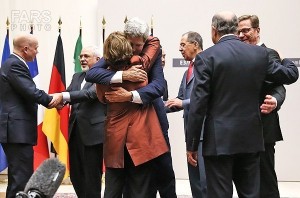 Advocates for a former Marine imprisoned in Tehran more than two years ago are seeking to use a diplomatic window created by the temporary nuclear agreement with Iran to gain his release.
Advocates for a former Marine imprisoned in Tehran more than two years ago are seeking to use a diplomatic window created by the temporary nuclear agreement with Iran to gain his release.
In a letter to President Obama released on Wednesday, four top former American defense and security officials urged “immediate action” to expedite the release of the Marine, Amir Hekmati, who has been held in Evin Prison with no publicly disclosed charges against him.
“Mr. Hekmati has committed no crime,” read the letter, signed by William S. Cohen, a former secretary of defense; Gen. Peter Pace, a former chairman of the Joint Chiefs of Staff; Gen. James L. Jones, a former national security adviser; and Gen. Joseph W. Ralston, a former allied commander in Europe. They wrote that Mr. Hekmati had “conducted his life with unyielding honor and courage.”
The letter followed the official start on Monday of a six-month accord between Iran and world powers in the protracted dispute over the country’s nuclear energy program, which the Iranians insist is peaceful despite widespread suspicions that it is a cover for developing a nuclear weapons capability.
Under the temporary agreement, Iran halted most uranium enrichment in exchange for limited relief from Western sanctions. The accord was intended to allow diplomats time to negotiate a permanent solution to the dispute, one of the biggest obstacles to improvement in an Iranian-American relationship fraught with decades of mutual hostility.
“As Iran and the United States attempt a formal accord in the next six months, now is the perfect time for the release of Mr. Hekmati,” the letter reads. “Freeing him is indeed in both nations’ best interests.”
Mr. Hekmati, 30, an American of Iranian descent from Flint, Mich., was taken into custody while on a visit to see his maternal grandmother and other relatives in 2011. He was accused of espionage, tried and sentenced to death, but the verdict was overturned and a new trial was ordered in March 2012. That trial has never happened, and the Iranian judiciary has never explained why he remains incarcerated.
His family has repeatedly said Mr. Hekmati is innocent and has pleaded for his release so he can return home while his father, stricken with brain cancer, is alive.
Dan Kildee, Mr. Hekmati’s Democratic congressional representative, who has made the effort to free him a priority, said in a telephone interview on Wednesday that the letter was part of a broader effort to raise attention to the plight of Mr. Hekmati, whose lack of access to legal counsel in Iran has illustrated what critics call its harsh and blatantly arbitrary justice system. The United Nations Human Rights Council’s Working Group on Arbitrary Detention has said Mr. Hekmati has been deprived of his rights.
“This letter is another important statement that there are people across the country who feel strongly about this,” Mr. Kildee said.
Mr. Hekmati is one of two, and possibly three, Americans in Iranian custody. The others are Saeed Abedini, a pastor who was sentenced in January 2013 to an eight-year prison term, accused of unlawfully creating a network of Christian churches in private Iranian homes, and Robert A. Levinson, an American intelligence operative and retired F.B.I. agent who has been missing for seven years.
American officials have said privately they believe that Mr. Levinson is in the custody of a group tied to Iranian religious leaders. Iran’s government has maintained it knows nothing of his whereabouts or fate.
American officials have also said that the imprisonment of United States citizens in Iran is among the issues that have been raised in the negotiations over the nuclear dispute, which are expected to resume in the coming weeks.
Iran has given no indication that it is prepared to release Mr. Hekmati, although his Iranian relatives have been allowed to visit him in prison. There has been a modest increase in optimism about the Hekmati case since the election last year of President Hassan Rouhani, considered a relative moderate whose overtures helped create the basis for the nuclear diplomacy.
Mr. Rouhani has said he wants to end Iran’s isolation and ease the severe restraints on personal freedoms that shaped the tenure of his conservative predecessor, Mahmoud Ahmadinejad.
Nonetheless, human rights activists and other critics of Iran say Mr. Rouhani’s government has done little, so far, to change Iran’s reputation for judicial abuses and heavy punishment of criminals and dissidents.
In Geneva on Wednesday, United Nations human rights experts reported a surge in Iranian executions this year, with 40 people hanged in the first two weeks of January, 33 of them in the past week.
“We are dismayed at the continued application of the death penalty with alarming frequency by the authorities, despite repeated calls for Iran to establish a moratorium on executions,” said Ahmed Shaheed, the special rapporteur on human rights in Iran, and Christof Heyns, the special rapporteur on extrajudicial, summary or arbitrary executions.
Iran is second only to China in the application of capital punishment, and most Iranian executions are of drug offenders.
Although there has been much discussion on possible changes to Iran’s penal code since Mr. Rouhani took office, Mr. Shaheed said, “it looks as if his pledges of reform have fallen on deaf ears in Iran.”
By The New York Times
The Iran Project is not responsible for the content of quoted articles.

 QR code
QR code